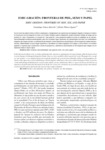Mostrar o rexistro simple do ítem
Emic-Gración: fronteras de piel, sexo y papel
| dc.contributor.author | Gómez Abeledo, Guadalupe | |
| dc.contributor.author | Piñeiro Aguiar, Eleder | |
| dc.date.accessioned | 2024-07-19T17:39:06Z | |
| dc.date.available | 2024-07-19T17:39:06Z | |
| dc.date.issued | 2019 | |
| dc.identifier.citation | Gómez Abeledo, G., & Piñeiro Aguiar, E. (2019). Emic-Gración: fronteras de piel, sexo y papel. Diálogo andino, 59, 7-19 | es_ES |
| dc.identifier.issn | 0716-2278 | |
| dc.identifier.issn | 0719-2681 | |
| dc.identifier.uri | http://hdl.handle.net/2183/38179 | |
| dc.description.abstract | [Resumen]: En este texto de carácter teórico-reflexivo analizamos e interpretamos las experiencias de migrantes llegados a Europa en el marco de un proyecto de investigación en torno a los Fondos Europeos para la Integración, donde realizamos trabajo de campo por un periodo de 3 años. Proponemos el concepto de “emic-gración” como propuesta analítica en torno al cuádruple eje de racismo- interculturalidad-resiliencia-autobiografías, para ello en primer lugar exponemos las metodologías activistas con colaboradores migrantes que llegan a destino; a continuación presentamos ciertas limitaciones metodológicas a la investigación (estadocentrismo, racismo, subalternidad); en tercer lugar exponemos y discutimos los relatos migrantes en el campo y a nivel teórico; en el último apartado se exponen unas conclusiones a modo de propuestas y alternativas interculturales de investigación que rompan con los dualismos clásicos objeto-sujeto. | es_ES |
| dc.description.abstract | [Abstract]: In this theoretical-reflexive text, we analyze and interpret the experiences of immigrants arriving in Europe within the framework of a research project on European Integration Funds, where we carry out field work for a period of 3 years. We propose the concept of “emic-gration” as an analytical proposal around the fourfold axis of racism-interculturality-resilience-autobiographies, for which we first expose the activist methodologies with the migrant collaborators who arrive at their destination; Below we present certain methodological limitations for research (state statism, racism, subalternity); third, we expose and discuss the histories of migrants in the field and at the theoretical level; In the last section, the conclusions are presented as proposals for intercultural research and alternatives that break with classical object-subject dualisms. | es_ES |
| dc.language.iso | spa | es_ES |
| dc.publisher | Universidad de Tarapacá (Chile) | es_ES |
| dc.relation.uri | https://doi.org/10.4067/S0719-26812019000200007 | es_ES |
| dc.rights | Atribución 3.0 España | es_ES |
| dc.rights | All the contents of this journal, except where otherwise noted, is licensed under a Creative Commons Attribution License | es_ES |
| dc.rights.uri | http://creativecommons.org/licenses/by/3.0/es/ | * |
| dc.subject | Fronteras | es_ES |
| dc.subject | Interculturalidad | es_ES |
| dc.subject | Emic-gración | es_ES |
| dc.subject | Trato | es_ES |
| dc.subject | Sexo | es_ES |
| dc.subject | Piel y papel | es_ES |
| dc.subject | Borders | es_ES |
| dc.subject | Interculturality | es_ES |
| dc.subject | Emic-gration | es_ES |
| dc.subject | Treatment | es_ES |
| dc.subject | Sex | es_ES |
| dc.subject | Skin and paper | es_ES |
| dc.title | Emic-Gración: fronteras de piel, sexo y papel | es_ES |
| dc.title.alternative | Emic-Gration: frontiers of skin, sex and paper | es_ES |
| dc.type | info:eu-repo/semantics/article | es_ES |
| dc.rights.access | info:eu-repo/semantics/openAccess | es_ES |
| UDC.journalTitle | Diálogo andino | es_ES |
| UDC.issue | 59 | es_ES |
| UDC.startPage | 7 | es_ES |
| UDC.endPage | 19 | es_ES |
| dc.identifier.doi | 10.4067/S0719-26812019000200007 |
Ficheiros no ítem
Este ítem aparece na(s) seguinte(s) colección(s)
-
GI-ESOMI - Artigos [97]






